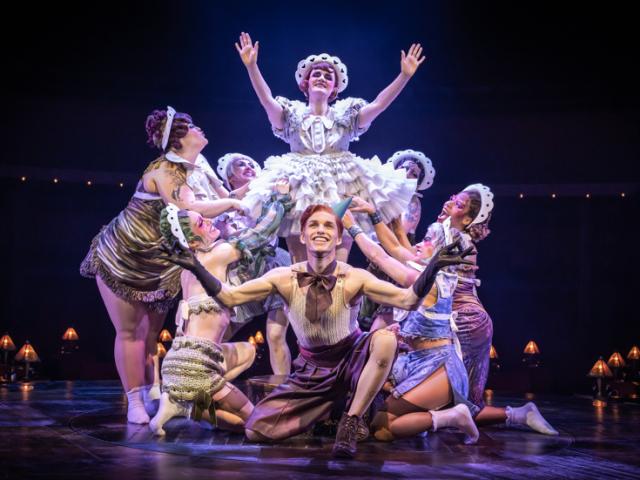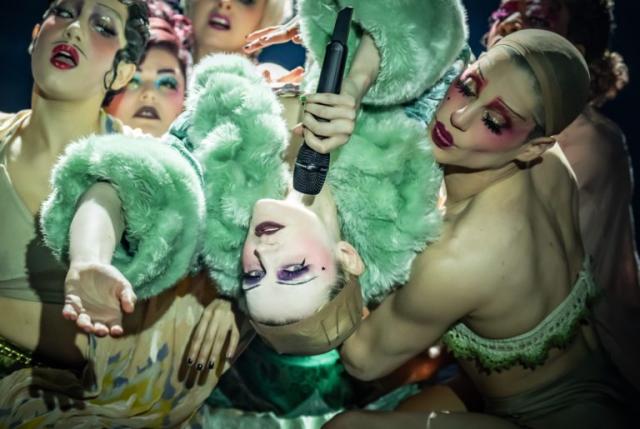

When Cabaret, the musical based on Christopher Isherwood’s “Berlin Stories” and I Am a Camera, John Van Druten’s straight-play adaptation, opened on Broadway in 1966, it was considered shocking but would probably be seen as tame today. Harold Prince’s original staging of the nightclub numbers was sleazy but charming, letting the audience feel loose, relaxed, and entertained. Then the introduction of swatiskas and the growing menace of Nazism in the second act came as a brutal shock. Adorable Joel Grey as the master of ceremonies was now a grim symbol of the Third Reich. As audiences have been anesthetized to the horrors of the Holocaust through numerous movies and TV shows (principally NBC’s 1978 mini-series on the subject), subsequent productions of Cabaret have become more gut-wrenching, but not necessarily more effective.
Prince’s 1987 revival recreated his staging and Ron Field’s choreography, and starred Grey again. Joe Masteroff’s book was slightly altered to transform protagonist Cliff Bradshaw from straight to bisexual to more closely align him with Isherwood’s gay identity as portrayed in the Berlin stories. Bob Fosse’s 1972 film version threw out Masteroff’s book, and Jay Presson Allen’s screenplay dealt more directly with the rise of German fascism. Then in the 1998 staging by Sam Mendes and Rob Marshall (and again when it was revived in 2014), the theater was transformed into a club, and the audience was immersed in the nightlife atmosphere. Nazi symbolism was more prevalent, but it did not overwhelm the initial experience of forgetting your troubles and enjoying booze and fun with Alan Cumming’s charismatic emcee (in both productions). The emergence of Hitler’s forces was not as gradual or soft-pedaled as in 1966, but the final image of swastikas, pink triangles, and death camps was devastating.
Rebecca Frecknall’s current Cabaret, the fifth Broadway production, now at the August Wilson following an Olivier Award-winning run in London, has no subtlety whatsoever. All the subtext is played right on top, and the final result is a case of assault and battery on the audience rather than a slow realization that the Reich could happen anywhere, even in a laugh-filled bistro. John Kander and Fed Ebb’s classic score still enchants, but their splendid songs drown in a sea of mannerisms and exaggerated staging. Instead of fun distractions and comments on the story, the nightclub numbers choreographed by Julia Cheng are grotesque freak shows. “Don’t Tell Mama” is now sung by a chorus of screaming chorus girls dressed as monstrous infants. “Two Ladies” becomes a soft-core orgy with the stage filled with whips and sex toys. The “Money” song is a death march instead of a clever parody.
As in the 1998 and 2014 productions, the audience is made a part of the Kit Kat Club, but Frecknall and her creative team have gone even further, renovating the entire August Wilson Theater into a multi-level seedy diva, perfectly evoking sleaze and glitz by Tom Scutt. Before the show theatergoers are handed free shots of schnapps and are treated to a troupe of seductive dancers and musicians twisting and contorting their bodies into sexy pretzels.
Once inside, Eddie Redmayne as the emcee leaves no doubt that he’s there to scare the pants off you, not to show you a good time. Rather than a charismatic charmer, Redmayne’s host is an evil puppet, bent over and all angled elbows, sometimes costumed by Scutt in an obvious death outfit, like the Grim Reaper in Fritz Lang’s “Metropolis” or Kurt Jooss’s “Green Table” ballet. He sings in an exaggerated German accent and delivers all his numbers with more than a dollop of gallows humor. His rendition of “I Don’t Care Much” is full of violent anger rather than sorrowful regret.
All can be saved if the actress playing Sally Bowles has the right combination of British bubbliness and reckless narcissism. Sally has to be an attractive figure in order for Cliff to sacrifice his morality to stay with her and to make the plot work. Unfortunately, Gayle Rankin plays Sally like a spoiled brat you want to get away from as soon as possible. Oh, you might buy this girl a drink and share a few laughs, but you definitely wouldn’t risk your safety for her, let alone take her home to meet the folks.
Like Redmayne, Rankin plays all Sally’s emotion on the surface. This is a pity because she has a fine voice and can be an expressive actress. Her performance of “Maybe This Time” (not in the original staging but written for Liza Minnelli for the film) is credibly heartbreaking, but Frecknall has directed her to deliver the climactic title song in a blind rage from start to finish, so she has nowhere to go but into a tantrum. Even more frustrating and baffling, she spends most of the show in a slip and for some reason, towards the end dresses in Cliff’s brown suit for her big number. Then the entire cast wears similar attire for a spooky finale. Perhaps to suggest the conformity of the Nazis?
Furthermore there is little chemistry between Rankin and Ato Blankson-Wood’s inexpressive Cliff. The secondary story of the ill-fated romance between landlady Fraulein Schneider (a luminous Bebe Neuwirth) and the Jewish grocer Herr Schultz (a pathetic Steven Skybell) lands more solidly. The tragedy of Aryan take-over of German life is made crushingly real by these veterans who underplay the action. Natascha Diaz is equally shaded as the cheerful prostitute Fraulein Kost.
The most successful performance is delivered by Henry Gottfried in the usually overlooked role of Ernst Ludwig, initially Cliff’s friend and guide to Berlin but later revealed as a racist thug. Gottfried is so endearing and easygoing in his early scenes, it’s truly a shock when he takes off a trench coast to reveal a twisted-cross armband. Conversely, because director Frecknall shocks us the entire evening, we emerge from the Kit Kat Club, dazed and numbed rather than horrified at what happened in Germany in the ’30s and what could easily be repeated here in the US, or anywhere.
